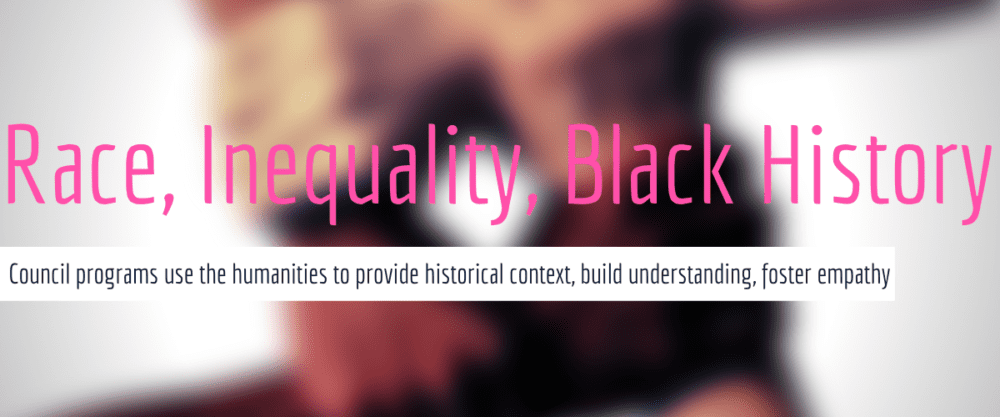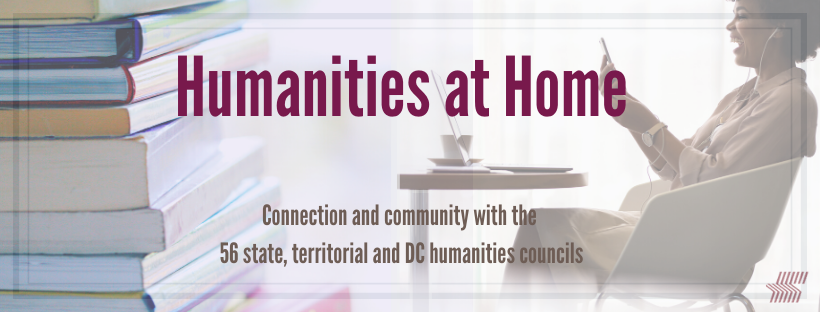“Michigan Humanities is thrilled to be hosting the 2021 National Humanities Conference in Detroit, MI. Detroit is an amazing city, full of rich history and bursting with vigor and vitality due to its transformation. This will be a once in a lifetime experience, full of Motown, rich experiences with the Arab Chaldean community, automotive history, the grandeur of the Detroit Institute of Art, and the depth of the Charles H. Wright Museum of African American History. We plan to make this an enriching and memorable experience for every conference attendee,” said Shelly Hendrick Kasprzycki, president and CEO of Michigan Humanities Council.
September Council Program Snapshot
In September, the state and jurisdictional humanities councils are hosting nearly 200 programs that address histories of racism, social injustice, racial biases, women’s suffrage and the right to vote, civic engagement, democracy and journalism, history, and more. Each council created or adapted their programming into virtual experiences due to the COVID-19 pandemic. The programs range from lectures to workshops and online exhibits to virtual book clubs.

FSHC Announces New Racial Equity Working Group
We are pleased to announce the formation of the Federation’s Racial Equity Working Group. Federation Board Member Gloria White Gardner (Maryland) and Maine Humanities Council Executive Director Hayden Anderson will serve as co-chairs. The group’s goals are to examine the Federation’s practices, policies, and programming, with the intention of coordinating institutional resources to help enact and support a race equity culture among our organization’s staff, board, and member councils nationwide.
August Council Program Snapshot
Throughout this month, the state and jurisdictional humanities councils are collectively running more than 140 programs across the country that touch on important themes affecting communities across the country, including programs on racial equity, suffrage, Indigenous and Native American women, civic engagement, democracy and journalism, and local histories. The programs range from lectures to workshops and from virtual happy hours to book clubs.

Interview with endawnis Spears on Land Acknowledgment, Native Communities and the Role of the Humanities Today
Humanities organizations have extraordinary power in the way that they frame not only our shared and distinct histories in the United States, but also imagining and shaping our collective future, and this includes Indigenous futures. Those of us engaged in humanities work have an opportunity to model what institutional equity looks like by creating long term initiatives that quantify and measure equitable representation within our institutions while also investing in programs that foster career pathways for young Native people, making it explicitly clear that humanities work can be a place of empowerment where they can shape the narratives about their own cultures and communities. Read more from endawnis here.

Interview with Keith Simmons, Florida Humanities Communications Director
Our objective isn’t to assume that we have all the answers; we want to work together with libraries, museums, historical societies, scholars, journalists, activists, and fellow citizens to celebrate fundamental dignity; collectively challenge the structures and issues that stand in the way of equality; and promote a true common good which is consistent with our founding principles.

Racial Violence, Inequity, and the Role of the Public Humanities
When I wrote my President’s message on my first day on the job just a little over a month ago, I included one of the Federation’s guiding principles: “The humanities strengthen the civic, cultural, and social fabric of society by fostering understanding and promoting an engaged citizenry.” I reiterate it now as we see our nation urgently needs learning, understanding, and healing. Today we also see the vital importance and evidence of an engaged citizenry across the country.

Sample of Council Programs on Race, Inequality, Black History, and More
Here is a small sample of programs offered by the state humanities councils on race, inequality, Black history, interracial communications, and more. These programs use the humanities to provide historical context, share personal experiences, and build understanding to better foster empathy.
Interview with Kevin Lindsey, CEO of Minnesota Humanities Center
“We at the Minnesota Humanities Center (MHC), similar to other humanities organizations that comprise the Federation, see ourselves as having three primary roles – convener, connector, and catalyst. All three roles are critically important.” Read more from Kevin Lindsey here.

Humanities At Home: Watch. Documentaries, Digital Shorts, Virtual Theater, and Festivals
Extend your documentary repertoire with several unique offerings from state humanities councils! Films from a wide range of topics such as Responding to COVID, the Veteran Experience, Women’s History and UNLADYLIKE2020, Virtual Theater, Hoosier Film Festival and more, can be found and viewed by just clicking a button. Let us know your thoughts by tagging us on social @HumFed and using #HumanitiesAtHome.

Interview with Delaware Humanities on Virtual Program: Distant Discussions
More than anything else, the humanities inspire empathy. The disciplines and tools allow you to see the world from someone else’s perspective. That’s more important than ever now, especially when we are physically distant.

Interview with Oregon Humanities on Virtual Program: Connect in Place
COVID has illuminated so much of what is already in place and what isn’t in place. And it has raised questions that are clearly rooted in the daily and long-term realities of people’s lives. In this moment, we’re trying to show up as a calm, encouraging, and reliable partner in creating opportunities for people all over Oregon to feel a strong sense of interpersonal connection and shared imagination. Read the full interview with Oregon Humanities Executive Director Adam Davis.
